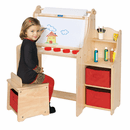LISA LELEU Super Star Theater Deluxe Edition
Customer Reviews
Accessories
BENEFITS of Drama, Theater and Puppetry
Self Confidence and Self Esteem: Performing for an audience teaches children to trust their ideas and abilities while overcoming shyness and fostering self worth. Through drama, self discovery and expression help instill confidence and boost self esteem.
Reading Skills and Literacy Learning: As children practice their roles, they reflect on the words while evaluating and revising how they interact with them while interpreting and communicating their meaning. Reading and acting out scripts increases sight-word vocabulary, reading comprehension and literature appreciation. Children blossom when they become more confident readers.
Communication/Oral Skills: Theater activities enhance oral expression including verbal and nonverbal expression of ideas, voice projection, articulation of words, fluency with language and persuasive speech.
Presentation Skills: The exercise of acting out scripts enhances reading fluency such as volume, stress, rate, tempo and intonation while improving presentation skills.
Imagination: Creating and acting out performances requires thinking of new ideas. Never underestimate the power of imagination. As Einstein said, “Imagination is more important than knowledge.”
Concentration: Theater activities help increase attention span as well as observation skills.
Listening Comprehension: By interacting with others, drama helps develop good listening habits.
Cooperation/Collaboration: The cooperative effort needed to create a puppet show or theatrical play increases a child’s ability to work with others, sharing ideas and solving problems together.
Problem Solving: Theater activities encourage imagination and improvisation. Improvisation fosters quick-thinking leading to greater adaptability in Life. Many teachers believe that improvisation is one of the very best ways for children to express themselves.
Motivation: Theater activities bring play, humor, fun and laughter into learning - improving motivation.
Self Expression and Relaxation: Drama and theater allow children to express emotions. Play acting activities release stress by releasing mental, physical and emotional tension.
Self Discipline: The process of moving ideas to actions and performances teaches the value of practice and perseverance. Drama and creative movement improve self-control.
Trust: The social interaction and risk taking in theater develop trust in self and others.
Self Confidence and Self Esteem: Performing for an audience teaches children to trust their ideas and abilities while overcoming shyness and fostering self worth. Through drama, self discovery and expression help instill confidence and boost self esteem.
Reading Skills and Literacy Learning: As children practice their roles, they reflect on the words while evaluating and revising how they interact with them while interpreting and communicating their meaning. Reading and acting out scripts increases sight-word vocabulary, reading comprehension and literature appreciation. Children blossom when they become more confident readers.
Communication/Oral Skills: Theater activities enhance oral expression including verbal and nonverbal expression of ideas, voice projection, articulation of words, fluency with language and persuasive speech.
Presentation Skills: The exercise of acting out scripts enhances reading fluency such as volume, stress, rate, tempo and intonation while improving presentation skills.
Imagination: Creating and acting out performances requires thinking of new ideas. Never underestimate the power of imagination. As Einstein said, “Imagination is more important than knowledge.”
Concentration: Theater activities help increase attention span as well as observation skills.
Listening Comprehension: By interacting with others, drama helps develop good listening habits.
Cooperation/Collaboration: The cooperative effort needed to create a puppet show or theatrical play increases a child’s ability to work with others, sharing ideas and solving problems together.
Problem Solving: Theater activities encourage imagination and improvisation. Improvisation fosters quick-thinking leading to greater adaptability in Life. Many teachers believe that improvisation is one of the very best ways for children to express themselves.
Motivation: Theater activities bring play, humor, fun and laughter into learning - improving motivation.
Self Expression and Relaxation: Drama and theater allow children to express emotions. Play acting activities release stress by releasing mental, physical and emotional tension.
Self Discipline: The process of moving ideas to actions and performances teaches the value of practice and perseverance. Drama and creative movement improve self-control.
Trust: The social interaction and risk taking in theater develop trust in self and others.
Copyright © 2002-2025 Madison Art Shop™ LLC. All Rights Reserved.





















